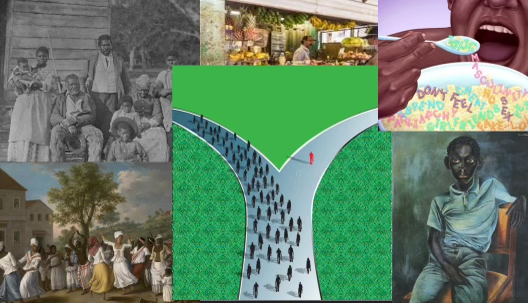Masculinity and the male community within Miguel Street is often demonstrated through acts of competitiveness and bravado as a way to preserve social reputation. The men on Miguel street strived to impress each other in ways to subtly prove their superiority over the others. When we look at the chapter “ The Pyrotechnist” we see how Morgan, who’s clearly insecure within his masculinity, uses bravado to try to intimidate the others.” These fits of craziness made Morgan a real terror. When the fits were on him, he had the idea that Bhakcu, the mechanical genius who was my uncle, was always ready to beat him……He would beat on the fence and shout, ‘Bhakcu, you fat-belly good- for-nothing son-of-a-bitch, come out and fight like a man.’Bhakcu would keep on reading the Ramayana in his doleful singing voice, lying flat on his belly on his bed. Bhakcu was a big man, and Morgan was a very small man, with the smallest hands and the thinnest wrists in Miguel Street.” (Hosein, 54). Morgan who’s described as frail and attention seeking particularly threatens Bhakcu, a larger man who pays him no mind. I believe that he feels that by challenging the largest man it will prove how much of a man he is. Another notable detail is that Morgan’s wife was described as larger than him, and too large to intimidate while Bhakcus wife was described as small. He describes his father stating, “He kept saying over and over again, ‘You people think I not a man, eh? My father had eight children. I is his son. I have ten. I better than all of you put together.’” ( Hosein, 58). This is where it all made sense to me, he compares his manhood stating that he has even more children , showing that his measure/idea of masculinity is based on a toxic family dynamic. However the masculinity represented wasn’t all negative. I was fond of the neighborhood’s care towards Bogart and his sudden disappearance. His disappearance evoked sadness in the men, as well as concern. Also Bhackus’ disregard for Morgan’s threats displayed his security and his masculinity, starkly showing us the difference in reactiveness between both men.
When you’re in a situation that encompasses your people and there isn’t a clear way out it’s easy to succumb to that stagnancy that living in Caribbean poverty can lead you to. I believe as a result, paired with the strained gender roles due to the destruction of family dynamics during slavery, these men portray some skewed version of a patriarchal life and household even though they are poor and don’t have much control as they force themselves to believe. Over time, the narrator begins to find himself entangled in the habits of the men on Miguel Street, “Without really knowing it, I had become a little wild. I was drinking like a fish, and doing a lot besides. The drinking started in the customs, where we confiscated liquor on the slightest pretext. At first the smell of spirits upset me, but I used to say to myself, ‘You must get over this. Drink it like medicine. Hold your nose and close your eyes.’ In time I had become a first-class drinker, and I began suffering from drinker’s pride.” (Hosein, 141). The narrator begins this through the perspective of a young boy, watching these events play out at a moldable, impressionable time in his life. He was being subconsciously influenced by these men, and unknowingly watching them not only normalized that life but also pushed him towards it! After long enough he succumbed to his environment, becoming,” too wild” . It made me kind of wake up and realize that the lifestyle of these men are cut and dry. It’s shown in the book and I see it in Caribbean culture in my everyday life. Many men on Miguel street were alcoholics and womanizers, the narrator being dragged into that cycle eventually himself.
Alcoholism and the normalization of domestic violence is far too apparent. In the book although everyone knew that Morgan was beating his children, there was some form of desensitization towards it. However when he jokingly publicly humiliated his kids that’s where Hat drew the line. The largest concern is the widespread normalization towards the topic, the lack of concern in the neighborhood when they were aware that this abuse was a habitual routine occurrence. Even after getting arrested, the narrator was still happy that he escaped imprisonment, although being an avid abuser. It’s important to share and analyze these subjects in literature because it provides just a small snapshot of what it’s like to grow up in this environment and provides insight on how generational trauma passes on its legacy. Learning about this is important because it’s the first step to unraveling those unhealthy habits and spreading awareness to it.

First off all Grace, I really enjoy your writing style! You have a clear and distinct voice that provides a reassurance to your analysis. Additionally, I really loved what you said about the normalization of poor behaviors such as domestic violence until a line is crossed. With the example you provided about Hat intervening, it makes me wonder what the breaking point was for him. Could it be that he saw similarities in how he was raised? I also wonder what the later reaction of the other men was ad how that affected his reputation on Miguel street.